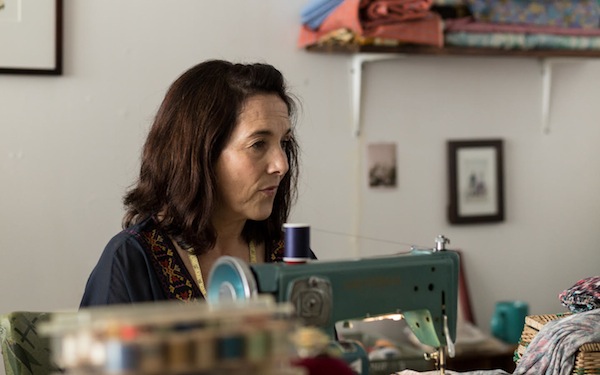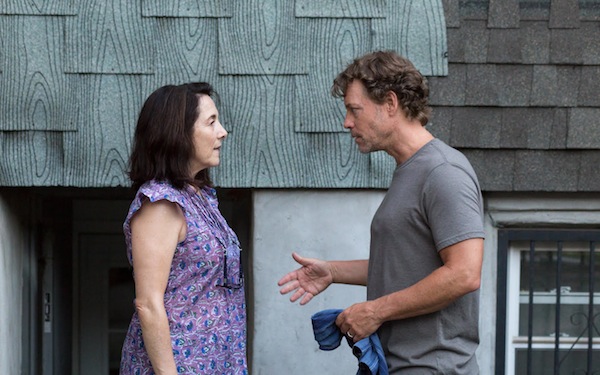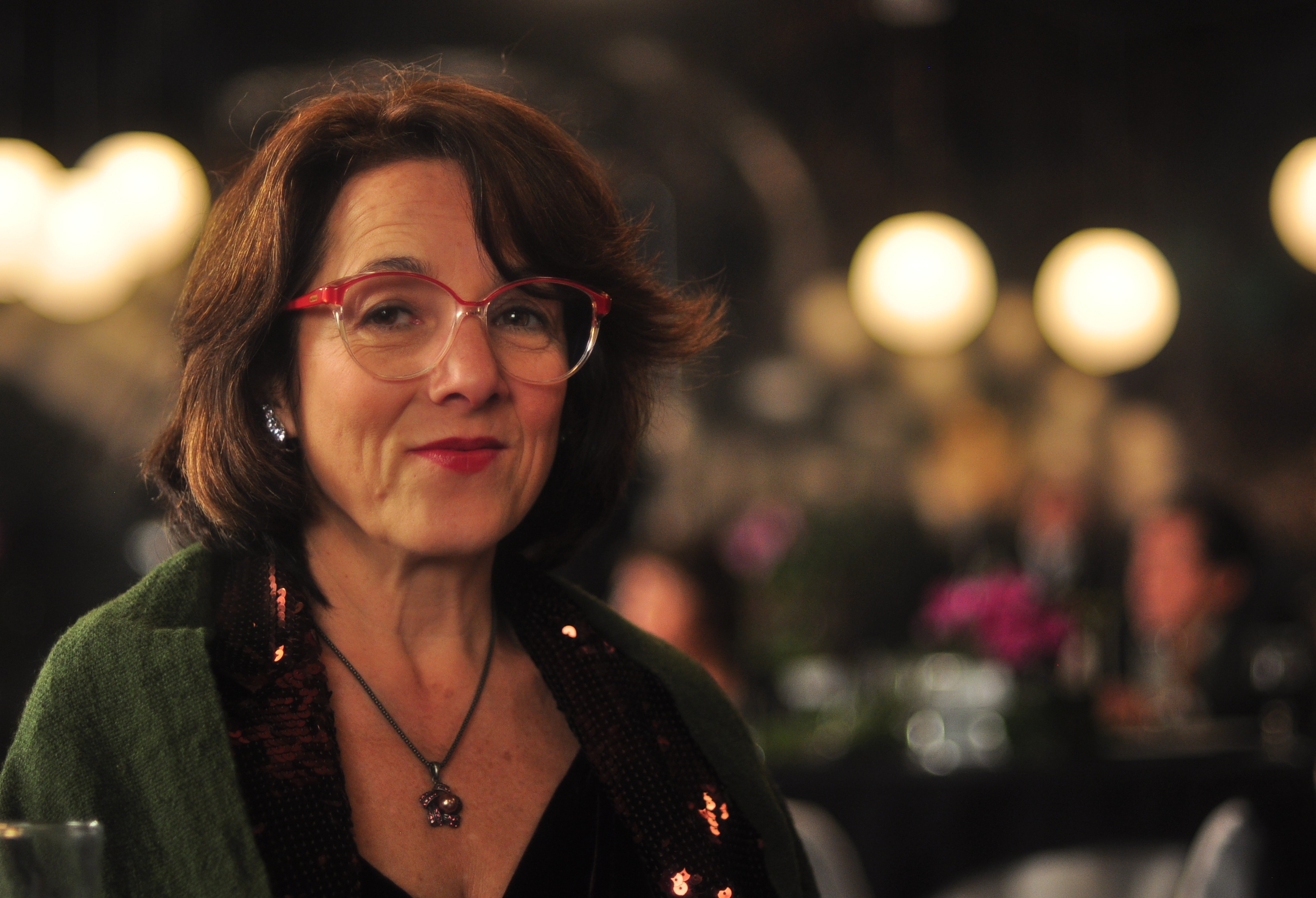
Audiences fell in love with Paulina García as the romantic heroine in Gloria, the Chilean sensation that won her the Best Actress award at the 2013 Berlin Film Festival and other honors along the way (including a nomination here). In that film she gave a delightful performance as a woman ready to find purpose in a life that others thought had lost all meaning. Where in Gloria she exuded a sincere need of approval and warmth, Leonor, her character in Ira Sachs’ Little Men is just the opposite. She’s a woman in full control of her emotions and moods, she seems a little bit too calculating to Brian (Greg Kinnear) who has just inherited a house from his late father Max, from whom Leonor rented a commercial space, and finds himself in the position of having to raise her rent. She’s also intimidating to her son Tony (Michael Barbieri) who lowers his head when asking her for permission to go hang out with his new friend Jake (Theo Taplitz) who happens to be Brian’s son.
But in García’s richly layered performance we see a woman on the edge, she’s about to lose everything she’s worked her entire life for and she refuses to go down without a battle. García is the kind of actor who is eloquent even when she’s not speaking, one of her glances can be more devastating than a Shakespearean soliloquy, a simple “no” from Leonor can contain an entire life history. I had the opportunity to speak to her from her home in Chile, to discuss her work with Sachs, actresses she loves, and why Leonor is such an important character for 2016...
JOSE: Leonor can come off as being a very cryptic character, she doesn’t say much with words, but her body language speaks volumes! What’s your work like when you encounter a character like this?
PAULINA GARCIA: I wanted her to be a woman who tried her very best in moments of turmoil, she’s living in a very extreme situation, pressured to make life-changing decisions she is asked to make as soon as possible. I tried for it to seem as if Leonor was aiming for the fastest resolution, even if that often brings people more problems. I thought for her at that moment, the best she could do was avoid more problems. Leonor also feels corralled, I don’t think one should punish oneself, so she tried to find someone to punish which is culturally something very Latin.
JOSE: I watched the film with a friend and we were both on opposite teams, I was rooting for Leonor and she was rooting for Brian and Kathy. Is it important for you as an actor to empathise with both sides?
PAULINA GARCIA: definitely think about the others, because they give you clues and tips to understand your own character. For example that place where this American couple is coming from in trying to be polite with Leonor, when there is really nothing polite about what they’re doing to her. She doesn’t even have the right to mourn Max’s death because there are no laws that protect friendship. It’s a fascinating dilemma because Ira shows friendship between the two children, but also between Leonor and Max, she’s mourning too but no one seems to understand this, even worse they invalidate her. I understand the other characters’ position of course, because it helped me channel the resentment she feels about having all her effort be worth nothing in the end.
JOSE: I loved that dynamic between Leonor and Tony (Michael Barbieri) because as an immigrant you can tell Leonor is trying to keep some of her traditions, she mostly speaks Spanish to him for instance, but he as an American wants to detach from that and become his own “original” person. How was it to work with Michael?
PAULINA GARCIA: That came in a very spontaneous way, I would talk to Michael in Spanish and he would talk to me in his full Manhattan English, which made it hard for us to understand each other sometimes, but also made us laugh a lot. He’s a lovely young man, a very focused actor for his age, Theo too is very talented, they both took their work very seriously. I hope the film reflects how wonderfully Michael and I got along. We were in a very cool sync.
What’s truly wonderful about Leonor is that she challenges the Latin stereotype we see in American films which always feature Latin characters who are drug dealers, gardeners, maids or prostitutes, in Leonor we see a very determined business owner. You shot this film last year, but it’s being released in a summer of great political uncertainty in which we see a monstrous GOP candidate who wants to get rid of people like Leonor, and strip them of rights they’ve earned. Can you comment on why it’s so important for American audiences to be exposed to characters like Leonor?
How lovely that you’re bringing this up, because it does make the film politically relevant. I believe Ira is a filmmaker with a very critical view of immigration policies, not necessarily only in America but all over the world. Immigration is a very rich topic that people should be more open to discussing, especially because America is the land of cultural mixture, it’s the basis the country was founded on, not white supremacy which is what someone like Donald Trump wants. I find it very interesting that the film came out now, because when we made it we didn’t think people would read it that way. It’s also interesting because our film isn’t about good vs. bad, it deals with how we should all strive to overcome our differences and achieve something better.
You’re doing Narcos for Netflix, what’s next for your character there?
The second season premieres in September and it’s absolutely intense. It’s a very powerful season which was a joy to shoot.
After Gloria you were able to make theatre in other Latin American countries, is there any chance we’ll see you onstage in New York?
I would love to! But we’ll see. I just directed a play in Mexico that just went on tour and it’s coming next to Santiago a Mil, one of Latin America’s most important theatre festivals. Other foreign projects include a couple of films in Argentina, I’m the lead in one of them, and play a supporting role in the other opposite Ricardo Darín, which is directed by Santiago Mitre. I’m very excited about all that.
Finally let me ask you, what other actresses would you like to work with at some point?
I would love to work with Jennifer Ehle again, we shared a few scenes in Little Men, but she was so wonderful, I would be thrilled to work with her again. If I’m allowed to dream, I would love to work with Ellen Page, I really like the quality she has, she works on what seems to be a very light level, but at the same time she is so complex that you never expect her characters to be so damaging and intense, and she does all of this with a sense of humor. I’m fascinated by her work, I just watched Tallulah and was left mindblown by her work. I also really like Frances McDormand, she’s out of her mind brilliant, she’s very honest, open and loves taking risks. I also find Jessica Lange moving and so sexy, she has something very childish and perverse about her that really touches me. Of course, one of my all time favorites is the magnificent Gena Rowlands.
Jessica, Frances and Jennifer have all won Tonys for their stage work, maybe you’ll get to direct them sometime?
Wouldn’t that be wonderful? (laughs)

Little Men is now playing in select theaters.